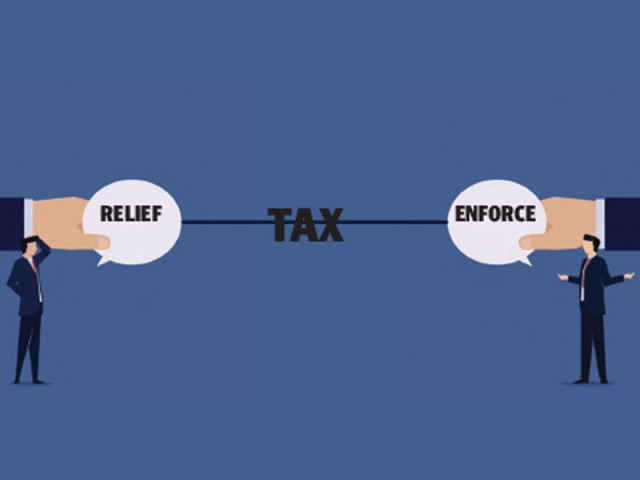Govt faces hard choices
Considers whether to scrap 15% tax on banks or collect more

The government faces a hard choice whether to abolish up to 15% additional tax on bank profits made by extending loans to the cash-starved finance ministry or tighten the existing law to recover about Rs60 billion more from financial institutions next year.
Sources told The Express Tribune that two opposing forces were working to influence the budget – one seeking relief for banks despite the potential heavy taxes on all major sectors and the second wanting to strictly enforce the law to collect taxes on banks’ lending to the government.
The Federal Board of Revenue (FBR) has proposed to the International Monetary Fund (IMF) that the existing tax on banks’ lending to the government needs to be tightened to plug a loophole that banks exploit to avoid up to 15% additional tax.
The additional income tax had been introduced in 2022 to encourage banks to give loans to the industry instead of making safe lending to the government. However, the banks often avoid the levy by readjusting their lending to the government just before the due date of December 31 for tax payment.
The FBR has proposed that instead of calculating the tax on the last day of the year, the tax liability should be determined on the basis of average annual lending to the government. It will close the window that banks use to withdraw their lending and park it in the central bank to avoid tax payment, said the sources.
However, the central bank is favouring the commercial banks and has urged the government to keep the tax unchanged, if it is not withdrawn. Sources said that there were also elements in the government who were in favour of reducing the tax burden on banks.
Under pressure from banks, the government had suspended the additional tax for 2023 but it again became effective from January 2024.
The normal income tax on banks is 39% but if a bank’s gross advances-to-deposit ratio (ADR) remains up to 40%, the government charges a 55% income tax on the investment made in government’s debt.
For the ADR of 40-50%, an income tax rate of 49% is applied and when the ADR crosses 50%, the bank is charged normal tax rate of 39%.
In June 2022, the FBR had estimated annual revenue of Rs25 billion despite the rates being quite lower at that time. Only one bank paid over Rs4 billion in ADR tax in 2022.
Finance Minister Muhammad Aurangzeb, a career banker, is expected to announce the budget on June 12.
Any move to provide relief to banks may raise concerns, particularly at a time when the government is going to slap 18% sales tax on almost all goods and services, including food products, milk and medicines.
For the next fiscal year, the government aims to set a Rs12.9 trillion tax collection target, which will require an unprecedented 40% growth within a year.
Banks paid a total of Rs655 billion in income tax during the tax year ended December 2023.
An attempt to avoid the tax had been made in February last year when the finance ministry got a summary approved from the cabinet to directly borrow from banks instead of through competitive bidding.
Direct lending would have allowed banks to avoid the ADR tax, as such lending does not fall within the category of loans given through treasury papers and investment bonds.
However, after a story published in The Express Tribune, the IMF barred the government from direct borrowing from banks.
The introduction of tax on higher lending to the government was aimed at forcing banks to behave responsibly through the fiscal policy tool. The government remains completely at the mercy of bankers after the door to borrowing from the central bank was permanently shut due to the IMF’s condition under its loan programme.
According to Pakistan Banks Association (PBA) Secretary General Muneer Kamal, up to 84% of the balance sheet of banks is invested in the government debt. PBA is of the view that the ADR should not be used as a tax measure to increase collection and should be left within the purview of the SBP.
PBA said that the ADR tax was merely a revenue collection measure and as could be seen from 2022 numbers it did not result in a sustainable increase in advances of the banking industry.
Banks are also persuading the government to lessen their income tax burden by adjusting taxes in line with the new International Financial Reporting Standards-9 (IFRS-9). The implementation of the new accounting standards has hit the capital adequacy ratios of banks as well as increased taxes on them.
The central bank has notified new regulations under the IFRS-9, which are applicable to banks from January 2024 and they are now required to prepare financial statements as per the IFRS-9.
Earlier, the banks were required to make provisions only against bad loans but now the new regulations seek provisions against all financial assets, including the performing loans, based on the expectation that a part of it can become non-performing in the future.
Sources said that banks had demanded that for tax year 2025 and onwards the opening impact of expected credit loss under the new regulations recorded in equity should be allowed to be collected in five years at the rate of 20% per annum. If the government accepts the demand, this will increase banks’ profits and reduce their monthly advance tax.
Published in The Express Tribune, June 5th, 2024.
Like Business on Facebook, follow @TribuneBiz on Twitter to stay informed and join in the conversation.



















COMMENTS
Comments are moderated and generally will be posted if they are on-topic and not abusive.
For more information, please see our Comments FAQ